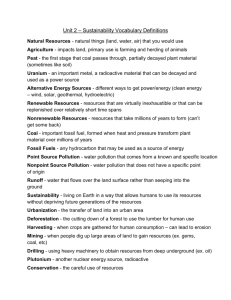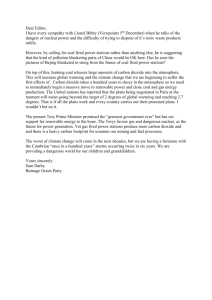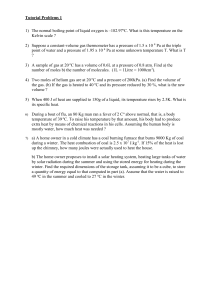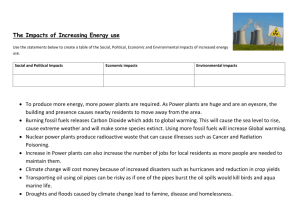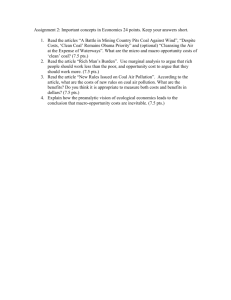fossil fuels - Riverside Secondary School
advertisement
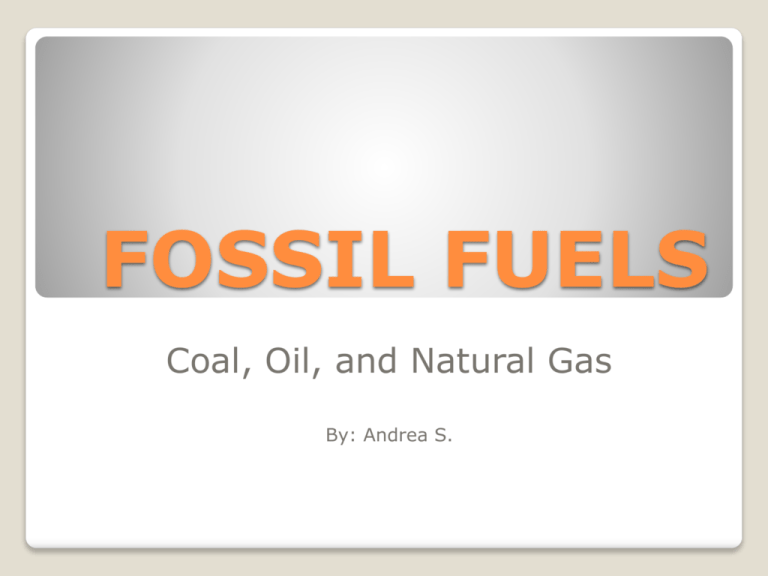
FOSSIL FUELS Coal, Oil, and Natural Gas By: Andrea S. Coal was used for heating by cavemen in England During Industrial Revolution, coal used to run steam engines 1880, started being used for generating electricity and heating Heat Electricity (50% from coal) One of cheapest ways Limited supply Air pollution Produces most carbon dioxide when burnt (global warming) Produces sulfur dioxide (breathing problems, contributes to acid rain) Strip mining destroys habitats Coal Mountain Elkview Line Creek Greenhills Fording River Brule Perry Creek Roman Mountain Trend Mine Quinsam Coal Mine OIL History of Oil • In ancient times, oil was easy to access (oil seeps on ground), used as medicine • 1850, American sold it in bottles to cure ailments • Many oil wells were drilled afterwards Pros and Cons • Electricity • Limited supply • Heating • Air pollution • Fuel for powering motors • Releases carbon dioxide • Boosts our economy (global warming) • Tanker ships can spill • Pipelines can burst • Releases sulfur dioxide (breathing problems, contributes to acid rain) • Disturbs habitats • Easier to pump out than coal Oil Refineries in B.C. • Burnaby Oil Refinery- largest in the province • Prince George Oil Refinery NATURAL GAS History of Natural Gas • 400 BC, Chinese used it to boil water • 100 AD, Persian king built his kitchen around natural gas flame (struck by lightning) • 1700, British used for lighting • 1800, used in North America for lighting • 1885, used for Bunsen burners Pros and Cons • Electricity • Heating • Liquefied for easier transportation, converted back to gas • Less pollution than coal • Can be bottled up for car fuel • Limited supply • Air pollution • Carbon dioxide (global warming) • Very flammable • Can’t see or smell • Explosions, oil spills • Disturbs ocean habitats Natural Gas Companies in B.C. • Montney Formation • Precision Drilling Corp. • Calfrac Well Service • Trican Well Service Ltd. GENERATION PROCESS • Fossil fuel goes to power plant • Burned in a boiler, water becomes steam • Steam goes through pipes to turbine • The steam spins the turbine blades. • Spinning blades cause shaft to turn inside generator • Electrical current is produced • Electricity travels through wires to cities Price • Approximately 9¢/kWh • Prices expected to rise because the supply is slowly running out Sources http://www.fe.doe.gov/education/energylessons/coal/coal_history.html http://kids.rrc.state.tx.us/school/classroom/coal/coaluse.html http://library.thinkquest.org/6075/coal.html http://www.fortisbc.com/About/RegulatoryAffairs/ElecUtility/Rates/Pages/default.aspx http://www.cbc.ca/news/canada/british-columbia/b-c-s-natural-gas-reserves-double-previous-estimates1.2417050 http://business.financialpost.com/2013/06/17/service-companies-buoyed-by-jump-in-gas-activity-in-b-c/ http://www.fplsafetyworld.com/?ver=kkblue&utilid=fplforkids&id=16196 http:///www.resilience.org/stories/2004-10-20/rising-fossil-fuel-prices-boost-prospects-renewable-energy# http://kids.britannica.com/comptons/article-286239/petroleum http://www.energybc.ca/map/fossilfuelinfrastructure.html http://rabble.ca/blogs/bloggers/progressive-economics-forum/2011/07/decarbonizing-homes-and-price-gas http://www.kidzworld.com/article/1423-fossil-fuel-energy http://www.energyzone.net/aboutenergy/fossil_fuels.asp http://www.darvill.clara.net/altenerg/fossil.htm
